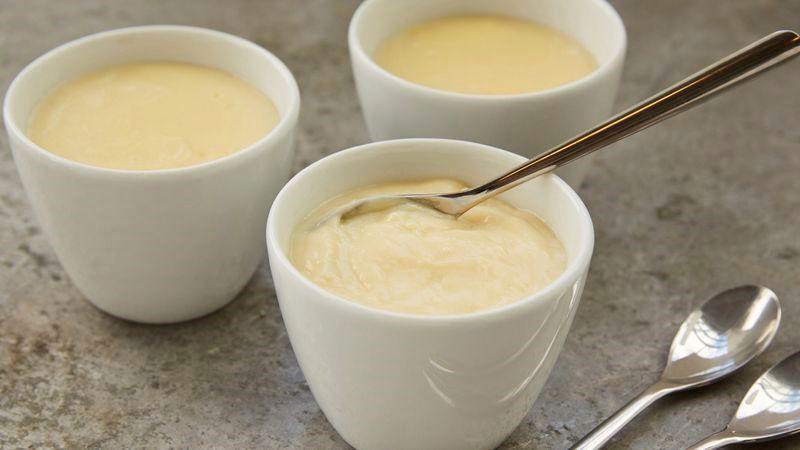
So, come on, admit it: who does not love pudding? Actually, that is not strictly true. Who does not love puddings, plural! Do we not just love ice cream; custard; trifle; pancakes; sponge pudding; gateaux; milk tart; lemon meringue pie; apple pie; banana split; banoffee pie; raspberry mousse; orange jelly; strawberry cheesecake; rhubarb crumble; grapefruit Alaska; crème caramel; crème brulee… oh, man, how long have we got?
It is so difficult to choose one above them all! One independent school in another country gave the pupils a choice of ten puddings every lunch and supper every day – and they could have all ten if they wanted! What could be a better place to work? Then there is a story of a waiter giving a youngster pudding, piling one after another high on his plate so that it was almost overflowing off the plate and then asked him if he would like cream on the top; his response was to say “No, it’s fattening” (as if the overloaded plate was not fattening)!
On another occasion a waiter was serving the same youngster pudding and as he asked for more and more, the waiter quietly but wearily commented, “Are you planning to eat it or to climb it?”
However, we are not here to discuss our favourite puddings or share recipes but we can say that we can learn a lot from puddings! Two expressions come to mind. The first is one which says that “the proof of the pudding is in the eating”. Now, we all know what a kudu and a Dodo is.
Have we ever had kudu pudding? We might have had crocodile tails, impala steak or ostrich stew but probably not kudu pudding! Kudu pudding is what some people make when they say “I could do that” – I kudu that! However, kudu pudding is a figment of the imagination – it is what someone could produce (but has not produced). Instead, we need to have did-do pudding, which might sound similar to dodo pudding but as the dodo is extinct, it is difficult to find them!
We have to go with the did-do pudding. The point is: some people are very good at saying ‘I could do that’ but people only want to know whether we did do that. An adult may say he can do a job in an interview but employers want to see the proof that he can do it. Are we preparing our youngsters to show they can do it?
It is easy to say we can or we are: it is much harder to show it, to prove it. If we think we are kind, prove it. If we think we are sweet (just like a pudding), prove it. The same applies if we think we are brave, tough, clever or smart: then prove it. The proof of the pudding is in the eating.
We must not, as individuals or as schools, just talk the talk but walk the walk. Right now, it is pudding time! Prize winners at Speech Days have shown throughout the year what they can do; the prizes therefore are the proof of the pudding. We are not meant to eat the prizes but we must enjoy them!
- The proof of the pudding
Keep Reading
The second expression is one that says that “we will all get our just desserts”. Is that not fantastic news? We will all get what we deserve for what we have done. That means that we have deserved our pudding, having been good boys and eaten all our greens! There is a certain acceptance that pudding comes at the end of the meal, and that we have to eat the other courses before we have our pudding.
We cannot simply skip the queue and go straight to the pudding! We must wait for it; it will come in due course. The same applies in our daily lives. We will all get what we deserve in the end, whether that comes in the form of a reward or a punishment – we will get what we deserve.
Some children at Speech Days might be upset not to get a prize, because they thought they had worked hard but whether they get a prize or not, in due course, they will get a reward (not necessarily at school). With that hope, they must keep at it and prove it even more. Do they think they are not noticed or appreciated? Wait, pudding is coming! Their just desserts are coming!
Speaking of pudding, we must not waffle on forever; after all, we might crumble if we go on much longer; we must not trifle with our time or else we will have to eat our words. Pudding is good for us: we can learn much from it.
Pudding should leave a sweet taste in our mouth, just as our life should leave a sweet taste for others. We just need to be the crème de la crème, to be the best we can be, to prove ourselves.
The proof of the pudding is in the eating, of that there is no doubt, so let us get down to see what puddings we have got today! Let us give our children dessert! And when we do, we will all get our just desserts – we might even get some cream on the top! Enjoy!
- Tim Middleton is the executive director of the Association of Trust Schools [ATS]. The views expressed in this article, however, are solely those of the author in his private capacity and do not necessarily represent the views of the ATS.
Email: [email protected]
website: www.atschisz











